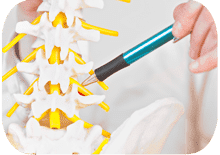
Degenerative disc disease refers to the changes that occur to the spinal discs as part of the body’s natural aging process. Spinal discs separate the vertebrae, the interconnected bones of which the spine is composed. While degenerative disc disease can occur anywhere within the spine, it most commonly affects the neck (cervical) and the lower back (lumbar) areas.
In addition to age, degenerative disc disease can occur as a result of small tears in a disc. These small tears lead to the release of nucleus, a jelly-like material found in the disc, which can cause the disc to bulge or rupture. Degenerative disc disease can also stem from a herniated disc. As with many conditions, those who smoke or are obese are at a higher risk of developing degenerative disc disease.
The symptoms of degenerative disc disease vary. Depending on the location of the degenerating disc, inpiduals may experience pain in the neck, back, arm, leg, or buttocks. In some cases, no pain is experienced, causing the condition to remain unnoticed. It is important to see a doctor if you experience persistent pain in any of the aforementioned areas.
To diagnose degenerative disc disease, your doctor will perform a physical evaluation and review your medical history. The physical examination typically entails inspecting the affected area for tenderness, changes in range of motion, as well as other potential conditions, such as infection or fractures. In some cases, x-rays may also be used to obtain a better view of the discs. Degenerative disc disease can often be managed with over-the-counter pain medications, such as acetaminophen or ibuprofen, and applying ice or heat to the affected area. More aggressive treatments may not be necessary unless additional conditions, such as osteoarthritis, have developed as a result of the degenerating disc. Such cases may require physical therapy or surgery to remove the degenerated disc. Your doctor will develop a customized treatment plan for your inpidual condition.

